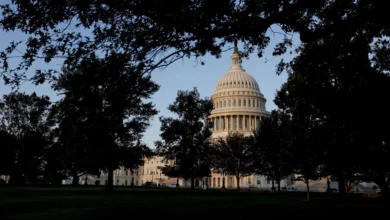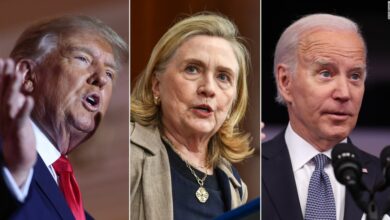With just days to go before the parliamentary elections, President Hosni Mubarak’s government seems to have successfully fended off the latest Western campaign of “foreign interference.”
The issue of international election monitoring–which was raised somewhat timidly by the Obama administration and much more emphatically by non-government actors–has been firmly shut down by a concerted Cairo counter-campaign. A harsh and highly critical US Senate bill advocating sweeping domestic reform in Egypt appears to have finally died last week.
But the trans-Atlantic hard feelings created over the past few months could linger for a while, and depending on how things go on Sunday, the whole debate could re-ignite fairly soon.
Egypt has insisted that it can handle its own domestic affairs and conduct fair, credible and transparent elections. Now Cairo will have to prove that it can actually live up to that standard. A failure to do so will only provide fresh momentum for its critics.
“If the elections on Sunday are perceived to be as non-transparent and lacking in credibility as people expect, then we could see a revival [of the Washington-based push for domestic reform]," said Stephen McInerny, the new executive director of the Project on Middle East Democracy–one of a handful of Washington think-tanks and advocacy groups who have formed the so-called “Egypt working group” to push for reform here. “These elections are viewed very, very skeptically here in Washington.”
The war of words has largely played out in the form of dueling editorials and think-tank reports. In comparison, the US government itself has been extremely cautious and diplomatic–a little too gentle, in fact, for many democracy advocates.
Last week, US State Department Spokesman PJ Crowley sounded almost apologetic in saying Washington “is not interfering in Egyptian affairs [but rather] encouraging a very close friend of the United States…that its people want to see and have opportunities for greater participation in Egypt's political system.”
The Egyptian perspective–and its consistently angry and defiant tone–was nicely captured earlier this week in a front-page Al-Ahram column by editor-in-chief Ossama Saraya. The headline pretty much says it all: “The Devil Preaches!”
The meat of Saraya’s column isn’t much more subtle. He dwells on “America’s failures” in Iraq and Palestine and dismisses US concern over Egyptian reform as a “cheap conspiracy” backed by a neo-conservative cabal, suggesting that Washington should learn from Cairo instead of lecturing it.
“We are not in need of American lessons in democracy or religious freedoms,” he concludes.
In Washington, observers have been left a little confused at just how harsh and defiant the Egyptian response has been–particularly since the Obama administration’s polite suggestions can’t compare to the strong reform launched several years ago under George W. Bush.
“US pressure has been fairly gentle,” said Steven Cook, a Middle East expert with the Council on Foreign Relations. “I mean, what really happened? It’s certainly not like it was in 2003 and 2004.”
McInerny pointed out that international election monitors aren’t exactly a grave insult to a country’s sovereignty–as multiple Egyptian officials have claimed. Since Egypt’s last parliamentary vote in 2005, six different Arab countries have allowed international monitors to observe national votes. Yemen, Morocco, Jordan, Lebanon, Sudan and the Palestinian Territories have all welcomed observers from either the European Union, the National Democratic Institute, or the Carter Center, he said.
“I’m not sure exactly why the government has adopted this belligerent tone,” McInerny said. “I don’t think it’s productive. It makes them seem increasingly isolated and backward on this issue.”
A successful defense against the international monitoring push is just one of the recent gains made by Cairo. It can claim a similar “victory” within the halls of the US Senate. For months, a resolution that bluntly called for sweeping domestic reform in Egypt was gaining impressive bi-partisan support in the Senate, with joint sponsorship from Democrat Russell Feingold and Republican John McCain.
That resolution was delayed earlier this fall after a comprehensive and expensive lobbying effort by Cairo. Feingold subsequently lost his Senate seat in elections earlier this month, robbing the initiative of one of its main backers. When the Senate briefly reconvened last week, there was a failed attempt to revive the Egypt reform bill, but it failed to gain enough support. Any future versions of the bill will have to wait until next year, when the new Congress convenes.
For now, it appears that Egypt has successfully won the right to conduct elections on its terms. But critics of the current state of Egyptian democracy will be watching closely.
“If the things that everybody suspects will happen do happen, it may force [Obama] to make a stronger statement on the issue,” Cook said.




